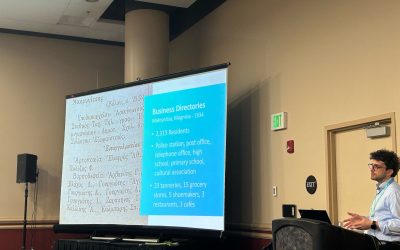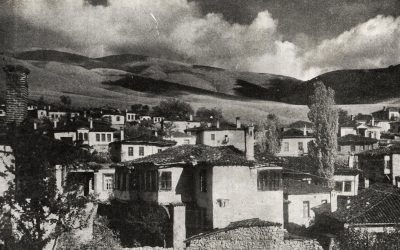By Giannis Michalakakos – Teacher of Family Studies, Msc Cultural Management
In Greece, most of the surnames derive from nicknames, patronymics (paternal given names), occupations and places of origin. The surname “Kassotakis” is an example of the latter case, meaning “the man who came from Kasos”, an island of the Dodecanese. From interviews taken in the area around Rethymno, Crete, where we can find several Kassotakis families, we conclude that these people are descendants of refugees who came to Crete after the Kasos catastrophe of 1824.
The Ottoman Empire could not suppress the Greek revolution of 1821 for over three years because of internal problems which required military presence: the revolt of Ali Pasha of Ioannina, the Janissary revolt in Istanbul and the general decline of the Ottoman forces which made the army incapable of facing serious revolts throughout the empire. The Ottoman army in the early 19th century was like a shadow of its past.
For these reasons the Sultan ordered his protectorate state, Egypt, to help him suppress the Greek revolution. In exchange the Sultan promised Egypt the regions of the Peloponnese (Morea) and Crete. The Egyptian army was not like the average irregular Ottoman army. The army of Egypt had been trained by French officers who knew the tactics of regular armies and modern warfare. Irregular units like the Mamluks and the Albanians were also added to the total force.
In 1821-1824, the island of Kasos had a commercial fleet consisting of over 100 vessels and 500 sailors. Upon the beginning of the Greek revolution, this fleet got armed with cannons, and practiced piracy against Ottoman ships along the coasts of Crete. The pirates from Kasos created lots of logistical problems to the Ottomans, and the island was targeted by Hussein Bey. Under the leadership of Ismail Gibraltar, the Ottoman – Egyptian fleet approached Kasos around the 28th of May. The people of Kasos got barricaded in the centre of the island over the port, looking straight towards the hostile fleet attacking. After continuous unsuccessful efforts to land at the island’s port, at night, the commander sent 3000 mountainous Albanians and landed them at a spot on the other side of the island that was not well guarded. The first days of June found the people of Kasos surrounded, without being able to escape. Their leader Markos Ioannou Malliarakis fought furiously to the very end.
The Egyptians and the Albanians looted the island for days. Of the island’s 7,000 people (5,000 from Kasos and 2,000 from Crete), 2,000 were enslaved and sent to slave markets in Alexandria; another 2,000 were executed during the operations. The rest escaped to Crete and the nearby islands to save their lives. The destruction of the island was so absolute that when Greek captains sailed to Kasos a few days later, they found “only some beggars and all houses looted.” Ismail Gibraltar proudly said to French naval commander De Rigny: “we didn’t leave anyone alive.”

National Historical Museum of Greece.

In 1826, the Kasians sent representatives to the National Council of Greece. These men had not come from Kasos, but from the island of Naxos where most Kasians had gathered after their escape. We hereby present the election document with the names of the Kasian representatives who lived in Naxos:
“Election Protocol for representatives of the island of Kasos
Residents of Kasos island acting in the name of homeland and its destruction that happened for the holy cause of the revolution, send Mr. Dimitrio Arvanitopoulo and Mina Sakellariou as representatives to have session with the other representatives from all provinces of Greece and decide the common interest of Greek Nation having the power to give their vote in the name of our homeland and its restoration in the third National Council.
Naxos, January 1st, 1826
Official Stamp of the Elders Of Kasos
Chatzikonomos Skevofylakas, Pavlos Protopapas, Cpt. Michalis Zachariadakis, Cpt. Kostas Arvanitopoulos, Cpt. Ioannis Katarzopoulos, Cpt. Dimitrios Iliadis, Ilias Ioannou Economos, Nikolaos Gioulios, Georgios Kantariopoulos, Cpt. Gazepis, Nikolaos Ioannou“

Many of these people never returned to their homeland. While Greece was liberated in 1830 (with the protocol of London), Kasos was not among the liberated islands, and many Kasians remained in other places of Greece like Naxos, Crete, etc.. These people were known as the refugees from Kasos. The nickname, and later surname, “Kasotakis” was used for and by many of them, reminding us of their place of origin.
I recently interviewed two families in Rethymno with the same surname. Even though they told me the same story of their family origin, they could not remember their original names. They also verified that they were not related, even though they lived in the same town. Because of their origin, Cretans had just given them the same nickname, Kasotakis. Nowadays Kasotakis can be found in many places of Greece, especially in the Aegean Sea, for the same reasons.
Sources
- https://paligenesia.parliament.gr/ Archive of Greek Paligenesia. Volume 20 p.51
- Juriendela Graviere, Ιστορία υπέρ του Ανεξαρτησίας των Ελλήνων Αγώνος κυρίως του Ναυτικού, Ιωάννης Νοτάρης: Αθήνα, 1896 σ. 137
- CH. Chabeaud Arnault, Το Ναυτικόν κατά τον υπέρ της ανεξαρτησίας της Ελλάδος πόλεμον ήτοι ιστορία των Ναυμαχιών 1821 – 1828, Αθήνα, 1882, σ. 53
- Finlay George, History of Greek Revolution, vol.2 William Blackwood and Sons, London 1861, p. 46 – 47
- Κ. Παπαρηγόπουλος, Ιστορία του Ελληνικού Έθνους από των αρχαιοτάτων χρόνων μέχρι των νεοτέρων, τόμος 5ος , Ν.Γ. Πάσσαρης: Αθήνα, 1874, σ. 887
- https://nhmuseum.gr/ Εθνικό Ιστορικό Μουσείο, Adam Friedel, Υδατογραφία σε χαρτί, Ismail Gibraltar, Λονδίνο, 1827.
- https://www.sansimera.gr/articles/1245



